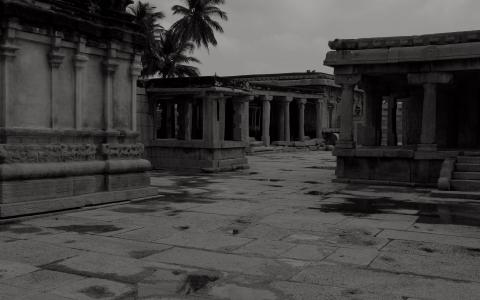March 2024

Nāyikā
The main heroine of the play is called the nāyikā; she, along with the nāyaka, plays the most important role in the drama.
The nāyikās are of three kinds – svīyā (‘one’s own’), anyā/ parakīyā (‘another’s’), sādhāraṇā (‘everyone’s’/ prostitute – veśyā).
A svīyā can either be a mugdhā, madhyā, or a pragalbhā depending on her experience in running a family. Aestheticians identify several more categories of nāyikās and finally arrive at...

चाणक्य यंहा दो शब्दों का प्रयोग करता है – ‘अपवाहयंति’ और ‘कर्षयंति’ अर्थात् ‘पूरीतरह से भक्षण करना’ और ‘उत्पीडित’ करना।
चाणक्य का कहना है कि यदि हम इन कठोर विपत्तियों से बचना चाहते है तो हमे अपने स्थानीय राजा की आवश्यकता है। सिकंदर के आक्रमण से जिस प्रकार उत्तर पश्चिम के राज्यों का विनाश हुआ था उसके उपरांत देश को जिस आशा और विश्वास की आवश्यकता थी वह चाणक्य के दूरदर्शी दृष्टिकोण द्वारा प्राप्त हुआ। चाणक्य ने न केवल एक शक्ति संपन्न साम्राज्य की स्...

About the relationship between husband and wife
In recent days, a school of political thought known as socialism is making a lot of commotion. Taking birth among the industrial workers of Europe, it might have been inevitable there. With the strong tendency in India to imitate others, a few people insisting that this system be implemented here have become powerful. One of the cardinal principles of that school of thought is that of universal...

Bhallaṭa
Bhallaṭa is best remembered as the poet who put the genre of anyokti (allegorical verses) on the map. He composed a century of verses and elevated this genre, which was only a trickle before. To this day, his poem arguably remains the best of its kind. A verse from the opening section of Bhallaṭaśataka describes the nature of suggestive poetry in a memorable manner:
बद्धा यदर्पणरसेन विमर्दपूर्व-
मर्थान् कथं झटिति तान् प्...

In Chikkapete area of Bengaluru, near the garment shop belonging to Late Rajasevasakta Pamadi Subbaramashetty, on a lane to the east of the shop, was a large house. It was an enormous bungalow. Advocate Venkatagiriyappa lived there. Venkatagiriyappa was my father’s maternal grandfather. His era was the period that the British began ruling the Mysore province. During that time judgement tribunals known as sadar adalat courts were established,...

Artha-prakṛtis
Artha-prakṛtis capture the gradual development of the plot. The Nāṭyaśāstra identifies five stages of development, namely
bīja (‘the seed’) – The segment of the play where an incident fundamental to the plot is portrayed
bindu (‘the vital drop’)– This segment of the play constitutes the gradual development and expansion of the ‘seed’ story
patākā (‘a sub-story/ episode’) – Episodes that add interesting dimensions to the story...

चाणक्य की असाधारण प्रतिभा
चाणक्य तथा चन्द्रगुप्त समान महानता और मनोवृत्ति वाले व्यक्ति थे। इसका साक्षात प्रमाण यह है कि अनेक वर्षों तक एक बृहत्साम्राज्य का उसके द्वारा सुचारु रुप से प्रबंधन किया गया । सात ही, अति महत्त्वाकांक्षी युद्ध प्रेमी सिकंदर के आक्रमण के प्रभाव को पूर्णरुपेण स्मृति पटल से ही मिटा दिया गया। इसी से ज्ञात होता है कि उनकी विकास की कार्य योजना कितनी प्रभावकारी थी। अपनी दृढ़ राष्ट्रीय अस्मिता भाव से प्रेरित उनका राष्ट्रप्रेम कि...

Now, with the advent of democracy, our lives are full of constant turmoil. The king reigned over a kingdom that was subject to rule by a single ruler. Democracy, on the other hand, has many leaders. It is difficult to achieve consensus with multiple leaders - more so about wealth and its distribution. So, what is theoretically thought to be a multi-leader system practically results in anarchy. A few are vocal for agriculture; others swear by...

समस्या – सञ्चुकोच कमलं दिनोदये
कमलानां दिनोदये विकासो दिनान्ते सङ्कोचश्च लोकप्रसिद्धः । इह तद्विरुद्धमभिहितम् इत्यसङ्गतिः ।
परिहारः –
सुन्दरीयमभिरूपदीर्घिकां स्नातुमुत्सुकतयाविशत्तदा ।
तन्मुखेन्दुमहसावहेलितं सञ्चुकोच कमलं दिनोदये ॥ (रा. गणेशः)
काचन सुन्दरी प्रभाते स्नातुकामा यदा वापीम् अविक्षत् तदा तस्या मुखचन्द्रस्य कान्त्या निस्ते...

Vastu
Vastu refers to the story or the plot of a play and is also referred to as itivṛtta. The vastu or itivṛtta is of two kinds – ādhikārika and prāsaṅgika.
The ādhikārika-itivṛtta refers to the main plot of the play – it is the primary story that runs through the play and is its most important thread.
For instance, in the Abhijñana-śākuntala of Kālidāsa, the story of Śakuntalā and Duṣyanta is the ādhikārika-itivṛtta (also referred to as...
